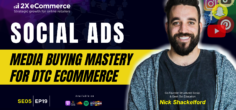Podcast
Learn from Fast Growing 7-8 Figure Online Retailers and eCommerce Experts
Amazon DSP: Using Amazon’s 1st-Party Audience Data for Media Buying
On today’s episode, Kunle is joined by Kimberly Maggard, Programmatic Advertiser at factor-a, a pioneer in Amazon vendor management with the combination of technology and agency performance working with over 100 international top brands.
With the upcoming changes in the media buying landscape, many brands are adapting their strategies and considering alternatives. One such alternative is Amazon Demand Side Platform (DSP). It is practically unscathed by the upcoming changes as almost all of its data is first party.
We’ve all shopped on Amazon, some more than others. This has made it a trusted choice for people the world over. Just to put things in perspective, upto 60% of product searches in the UK BEGIN on Amazon. That’s a lot of data with a fair amount of segmentation built in. But should DTC brands jump on the bandwagon?
In this episode, Kunle and Kimberly talk about all things Amazon DSP. You will get to hear about how the platform is structured, how the segmentation works, the media buying process and how DTC brands can get in on it . This is a great episode for marketers and business owners alike!
Here is a summary of some of the most important points made,
-
- Changes to 3rd party cookie data won’t affect Amazon DSP
- Amazon DSP works on a CPM model
- It is possible to measure conversions on Amazon for ads served off Amazon
- You can advertise services or products that aren’t otherwise available on Amazon
- Amazon wants conversions to happen on Amazon, so BOFU activity is restricted
Covered Topics:
On today’s interview Kunle and Kimberly discuss,
- What is Amazon DSP
- Segmentation
- Google Ads vs Amazon DSP
- Down sides
- Using DSP as a DTC brand
- Retargeting
Timestamp:
- 10:20 – Meet Kimberly and factor-a:
- 5 years old company based in Germany
- Over 100 employees strong
- Serve a global market of brands
- 12:05 – What is Amazon DSP?
- Demand Side Platform
- Similar to Google search
- DSP is fairly new
- CPM based
- Used for TOFU and MOFU activities on Amazon
- Customer purchase behaviour oriented
- 14:38 – Segmentation:
- Lookalike audiences
- Amazon places you in many larger segments as per buying history
- 15:35 – Amazon DSP in post cookie world:
- Segmentation will continue to work well because it’s 1st party data for Amazon
- “99% of data used is first party data”
- 16:25 – Buying Media:
- Works similar to Google ads
- There is a auction system
- Ads are shown offsite in the same spaces like Google ads
- 17:50 – Google Ads vs Amazon DSP
- Misconception as a LOFU channel
- A/B testing to check where your converting customers come from
- 19:55 – Reporting & Attribution:
- Possible to measure conversions on Amazon for ads served off Amazon
- Service called Amazon Attribution Data – still in Beta
- “Spend money where the conversions are happening”
- “60% of product searches begin on Amazon”
- 23:40 – Why customers prefer buying on Amazon over websites
- 26:45 – Does Retargeting work?
- Pixel retargeting works
- Amazon has rules regarding “linking out” campaigns
- DTC campaigns tend to be MOFU
- Amazon wants conversions to happen on Amazon, so BOFU activity is restricted
- 33:50 – The flipside, why DTC may not want to sell on Amazon:
- Loss of control on Data and Pricing
- Competition from Amazon for same products
- Hidden or Additional fees
- Loss of branding
- “Fear of Amazon knocking off your product is overinflated”
- 39:30 – Using DSP as a DTC brand
- Amazon doesn’t allow ads if you sell similar products on your own site
- You can advertise services or products that aren’t otherwise available on Amazon
- 42:50 – Using exclusions in your targeting
Takeaways:
- 60% of product searches begin on Amazon
- DTC campaigns tend to be MOFU
- 99% of data used is first party data
- Amazon DSP works on a CPM model
- It is possible to measure conversions on Amazon for ads served off Amazon
Links & Resources
Tweetable Quotes:
“Spend money where the conversions are happening.”
Facebook Group • Continue the Conversation
The eCommerce GrowthAccelerator Mastermind Facebook Group has just launched.
It is a community…
✔️ for founders and experts passionately involved in eCommerce
✔️ for the truly ambitious wanting to make an impact in the markets they serve
✔️ for those willing and open to help and share with other members
Here is where to apply to join the Facebook group
>>http://bit.ly/ecommercefb<<
———–
SPONSORS:
This episode is brought to you by:
![]()
This episode is brought to you by MESA Workflow Automation. Mesa is THE only automation platform that enables all Shopify merchants to create workflows that automatically carry out repetitive tasks and focus on their business.
TRY MESA FOR FREE OVER 14 DAYS on GetMesa.com or search for MESA on the Shopify App Store.
This episode is brought to you by Klaviyo – a growth marketing platform that powers over 25,000 online businesses.
Direct-to-Consumer brands like ColourPop, Huckberry, and Custom Ink rely on Klaviyo.
Klaviyo helps you own customer experience and grow high-value customer relationships right from a shopper’s first impression through to each subsequent purchase, Klaviyo understands every single customer interaction, and empowers brands to create more personalized marketing moments.
Find out more on klaviyo.com/2x.
![]()
This episode is brought to you by Rewind – the #1 Backup and Recovery App for Shopify and BigCommerce stores that powers over 80,000 online businesses.
Direct-to-Consumer brands like Gymshark and MVMT Watches rely on Rewind.
Cloud based ecommerce platforms like Shopify and BigCommerce do not have automatic backup features. Rewind protects your store against human error, misbehaving apps, or collaborators gone bad with Automatic backups!
For a free 30-day trial, Go to Rewind Backups,
reach out to the Rewind team via chat or email and mention ‘2x ecommerce’

This episode is brought to you by Famous.
Famous enables brands on Shopify to easily build beautiful landing pages and product pages that include custom video, animations, and more. All pages built on famous are optimized for storytelling and selling on desktop and mobile.
Famous’ software allows you to build your pages in minutes without code, so you don’t need a developer. You just need to want to build a better experience for your customers. Famous has worked in the past with many leading online retailers including Honest, Justfab and more.
You can try it for free at famous.co/2x.
![]()
This episode is brought to you by ShipBob.
ShipBob is an end-to-end global fulfilment provider trusted by thousands of DTC brands. With the recent launch of their first UK fulfilment centre, in London, merchants that work with ShipBob now have access to ecommerce markets in Europe as well as North America.
ShipBob was ranked the #1 Fulfilment Tech Platform by AdWeek’s Retail Award and enables affordable 2-day shipping. Get your products picked, packed, and shipped.
Go to Shipbob.com/2x to get $500 in free shipping credits today.






